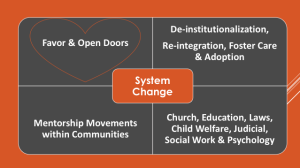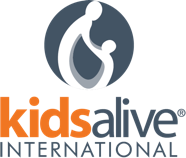At the Crossroads of the Kingdom—Part 4: System Change
 “Think systems.” With this statement, Dr. David Cross challenged an auditorium full of child welfare workers in Lima, Peru. This core commitment of the Karyn Purvis Institute of Child Development (TCU) echoes an emphasis in Kids Alive International’s expanding model of care to deliver God’s whole love to children and families. Both KPICD and KAI have realized that influencing systems represents a significant contribution to lasting change in a child’s world.
“Think systems.” With this statement, Dr. David Cross challenged an auditorium full of child welfare workers in Lima, Peru. This core commitment of the Karyn Purvis Institute of Child Development (TCU) echoes an emphasis in Kids Alive International’s expanding model of care to deliver God’s whole love to children and families. Both KPICD and KAI have realized that influencing systems represents a significant contribution to lasting change in a child’s world.
At first glance, thinking systems seems impersonal and distant from the individual child. For a child can get lost inside or outside of a system. A healthy system differentiates individual children within it to promote each one’s flourishing. In contrast, a child loses a sense of self in an unhealthy system. With at-risk, abused, and abandoned children, an over-reaching system can institutionalize and violate dignity. Or a lack of system support denies children necessary interventions for restoration.
Systems thinking has increased in our family’s story of wholeness and mission. Families, churches, communities, organizations, and governments represent types of systems. Creation itself contains many systems that teem with life. The tragic fall of creation unveils the enemy’s deceptive aim to distort and disrupt systems. From the first family in the garden to a society of families herding their resources and energy for their own greatness, family systems falter in the face of God’s presence. Out of the backdrop of Genesis 1–11, God calls Abram in Genesis 12, who responds by leaving His father’s household and homeland. Redemptive family system begins with the promise of one day including the families of the earth. This promise also extends to a new creation system that includes a new heaven and new earth.
Jesus proclaimed a system come to earth known as “the Kingdom of God.” Paul spoke of individual dignity and purpose for individuals as differentiated parts joined in one Body. When Jesus confronted his followers for seeking greatness on their own terms, he did so by placing a child in their midst, and calling them to enter His Kingdom on His terms. Jesus reveals the system of His kingdom through an individual child in His arms and at His side. Truly, the work of welcoming children in His name relates to ushering in His Kingdom.
Kids Alive’s expanding model of care reflects a global wave breaking across the globe to de-institutionalize child welfare systems by turning attention to family placements and re-integration of children separated from families. However, a rush to re-unify potentially places a child back into a setting in which they experienced trauma. Kids Alive desires to step into this gap with trauma-informed care training that includes therapeutic interventions to support the restoration of individual children and family systems. This entails impacting communities and spheres of societal support for children and families.
Not only through KAI’s own program centers, a commitment to “thinking systems” means collaborating with other agencies and experts and administrative departments in order to change a child’s world. Many an organization has talked of changing the world. Through a Kingdom commitment to systems change, KAI increasingly speaks of changing a child’s world. KAI aims to proclaim the gospel of the Kingdom as good news for redeeming kids and their surrounding systems.
Standing together,
Mark, Kristin, Caleb, Jacob, and Rachel Coté
Regional Director, Latin America
mark.cote@kidsalive.org
www.kidsalive.org
Click here to partner with our family through support of Kids Alive. Click here for prayer requests related to our family and service. Click here to receive e-mail notifications of new posts on our Glordinary Goings blog.
